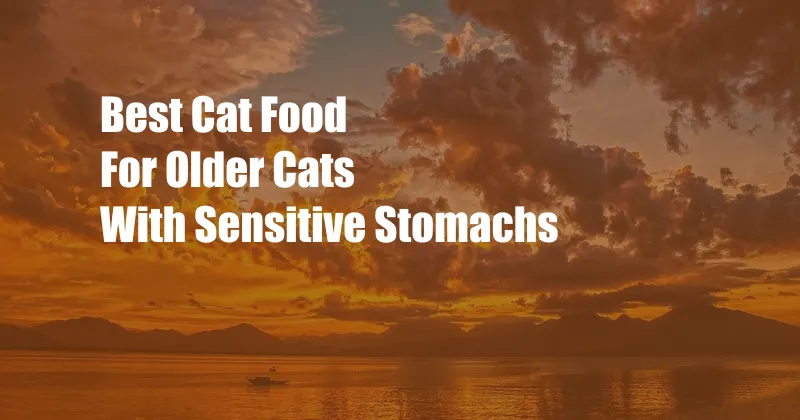
The Ultimate Guide to Finding the Best Cat Food for Older Cats with Sensitive Stomachs
As our beloved feline companions enter their golden years, their dietary needs can become more complex. Senior cats often experience decreased appetite, weight loss, and digestive issues, making it crucial to find the best cat food that meets their changing nutritional requirements and supports their sensitive stomachs.
In this article, we’ll delve into the specific considerations for feeding older cats with sensitive stomachs and provide a comprehensive guide to choosing the most suitable cat food. We’ll discuss the latest trends and developments in feline nutrition, share tips from experts, and answer common questions to help you make an informed decision for your furry friend.
Understanding Sensitive Stomachs in Senior Cats
Sensitive stomachs, also known as gastrointestinal (GI) sensitivity, are common in older cats. As they age, their digestive system becomes less efficient at breaking down food and absorbing nutrients. This can lead to a variety of symptoms, including:
- Vomiting
- Diarrhea
- Flatulence
- Constipation
- Weight loss
- Reduced appetite
These symptoms can be caused by a variety of factors, including food sensitivities or allergies, inflammatory bowel disease, and other underlying medical conditions. It’s important to consult with a veterinarian to rule out any underlying health issues and determine the best course of action for your cat.
Choosing the Ideal Cat Food for Senior Cats with Sensitive Stomachs
When selecting a cat food for an older cat with a sensitive stomach, there are several key considerations:
- Digestibility: Look for cat foods that are highly digestible, containing easily absorbed ingredients such as hydrolyzed proteins and novel carbohydrate sources.
- Fiber content: Dietary fiber helps regulate digestion and prevent GI upset. Choose cat foods with moderate levels of soluble and insoluble fiber.
- Limited ingredients: Avoid cat foods with a long list of ingredients, especially those containing common allergens such as corn, wheat, soy, and dairy.
- Antioxidants: Antioxidants help protect the digestive system from damage and inflammation. Look for cat foods fortified with antioxidants such as vitamins E and C.
- Palatability: Senior cats often have reduced appetites, so choose a cat food that is highly palatable and appealing.
Recent Trends in Feline Nutrition for Sensitive Stomachs
The field of feline nutrition is constantly evolving, with new research and developments emerging all the time. Some of the latest trends in feline nutrition for sensitive stomachs include:
- Prebiotics and probiotics: These beneficial bacteria support a healthy digestive system and can help alleviate GI upset.
- Omega-3 fatty acids: These essential fatty acids have anti-inflammatory properties that can help reduce gut inflammation.
- Grain-free diets: Some cats with sensitive stomachs may benefit from a grain-free diet, as grains can be difficult to digest.
Tips and Expert Advice from Feline Nutritionists
Here are some tips and expert advice from feline nutritionists to help you choose and transition your senior cat to a new cat food:
- Introduce new food gradually: Mix the new food with the old food over a period of several days to avoid GI upset.
- Monitor your cat’s health: Pay attention to your cat’s appetite, weight, and litter box habits after making any changes to their diet.
- Consult with your veterinarian: Always consult with your veterinarian before making any significant changes to your cat’s diet to ensure it is safe and appropriate for their individual needs.
FAQs About Cat Food for Senior Cats with Sensitive Stomachs
Q: What are the best ingredients to look for in cat food for senior cats with sensitive stomachs?
A: Easily digestible proteins (e.g., hydrolyzed chicken, fish), soluble and insoluble fiber, antioxidants, and omega-3 fatty acids.
Q: What are some common allergens in cat food that can cause stomach upset?
A: Corn, wheat, soy, dairy, and certain proteins (e.g., beef, chicken).
Q: How often should I feed my senior cat with a sensitive stomach?
A: Divide the daily feeding amount into two or three smaller meals to reduce the risk of GI upset.
Conclusion
Feeding an older cat with a sensitive stomach requires a tailored approach. By considering their unique dietary needs, staying abreast of the latest trends in feline nutrition, and following expert advice, you can find the best cat food to support their digestive health and overall well-being. Remember to consult with your veterinarian to ensure the chosen food meets your cat’s specific requirements.
Are you interested in learning more about the best cat food for older cats with sensitive stomachs?